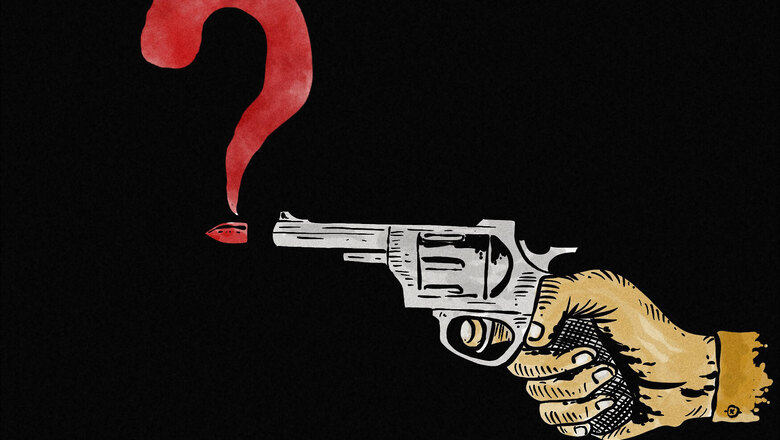
views
“I’ll be judge, I’ll be jury,” said cunning old Fury: “I’ll try the whole cause, and condemn you to death.” - Alice in Wonderland, Lewis Carroll
There is one simple issue at the heart of the horror and brutality in the recent incidents in Telangana – how and why did the police delay the search for the victim of the fatal rape. That is the focal point of lack of accountability and failure although it is a separate case to the killings of the accused.
But we need to remember and recognise that public anger exploded first at the unacceptable delay by police in heeding the pleadings of the family. A few days later the shooting of the four accused turned that public anger into praise for the police.
While the matter needs thorough investigation, at first glance the police version of the killings of these four accused in Telangana has numerous gaps, to say the least, because at the very fundamental level it strains credulity.
First of all, there is the bothersome issue of handcuffs. Were they wearing them or were they not? If they were, then how did they free themselves from these iron cuffs, grab weapons from the 10 armed policemen guarding them, shoot at them, before being gunned down in the ensuing battle? The police should be aware that in this day of AI and accessible information from almost any point of the planet, a Bollywood or Hollywood version of the event will not stand scrutiny.
The grim reconstruction of the scene of the horrific rape and murder of the young veterinarian, the crime of which they were accused, now has a huge gaping hole which cannot be closed or even papered over because the persons blamed for that brutality cannot ever be questioned. The issue of handcuffing is one of the most critical aspects of the incident into which an investigation has been ordered by the National Human Rights Commission as well as inquiry sought by civil society organisations everywhere. And there’s an additional query: if the men weren’t handcuffed at the time when they tried to flee, were they wearing these restraints when they left the prison?
If the handcuffs were on them at the time of the event, two dramatically different scenarios lie before us: one, the men had miraculously torn off their cuffs, overpowered a few of the guards and grabbed their guns before being shot. The second is truly dire and reminds one of incidents involving the shooting of civilians by security personnel, including policemen, in Manipur, Assam, Meghalaya, Nagaland, Andhra Pradesh and other parts of the country.
Another simple point is whether the accused men knew how to handle weapons. These were truckers, from lower middle class or poor backgrounds: were they used to handling rifles or a single-bolt .303 let aside automatic weapons? Also, why were they taken in the early hours for a crime scene reconstruction? And was it not possible for the policemen to incapacitate any of the accused instead of shooting all four of them fatally.
I note here the comments of the Chief Justice of India that “justice loses its character of justice if it becomes revenge”. And those of the police officer, Hasmukh Patel, who said in a tweet: “Fake encounters give people false satisfaction of justice and frees us from our responsibility of making our criminal justice system speedy and effective that is capable of creating real fear of law.”
The recent incidents bring back a rush of many unhappy, unwelcome memories of men in uniform (women have rarely been associated in such ‘encounters’) being involved in extrajudicial killings. It is not just the brutal rape, torture, mutilation and murder of a 32-year-old woman from Manipur allegedly involving personnel from the Assam Rifles, which led to an outcry seeking the abrogation of the Armed Forces Special Powers Act (AFSPA) that has been in place in parts of the Northeast since 1958. It’s also about those like Chungkham Sanjit in Imphal whose shooting (the-then state chief minister congratulated the killing of a ‘terrorist’) and that of many others a Manipuri police officer has owned up to in an affidavit before the Supreme Court. What of Punjab in the late 1980s and ‘90s? Hasn’t enough been written on how people disappeared, were ‘encountered’ and police officers rewarded, promoted and lionised? Is that really a path we want to go down again?
The events also raise a set of uncomfortable issues: if executions are to be the way of summary justice and we bow to the baying for blood, then are we not asking for the dismantling of the entire criminal justice system of courts, prosecutors, defending counsel and investigations? That the criminal justice system is overburdened, slothful and at times corrupt is no secret. This has created the kind of frustration in the minds of the public that is playing out with praise for the actions of the Telangana police. Many who are involved in litigation can testify to the lethargy of the court process.
As in the Unnao rape and death, and the killings of villagers that a Chhattisgarh judicial inquiry has uncovered, it is the usual voices of human rights defenders who are asking the uncomfortable questions of authorities: how can officers, in uniform or out of it, not be held accountable for their actions? Are people entitled to even a semblance of a fair trial? Are they not entitled to even a sense of safety?
While listening to the crowing and praise for the police, I’m missing the voices of the country’s leaders in calling for accountability, for the rule of law and to actually set a time frame to implement the many pending recommendations of the various national police commissions as well as of the Supreme Court to make life safer and justice more accessible, not just swifter.
(The author is International Director with the Commonwealth Human Rights Initiative. Views are personal)
















Comments
0 comment